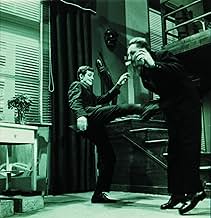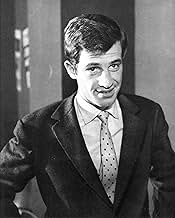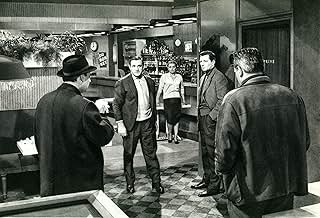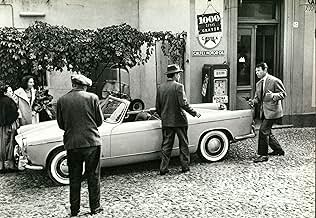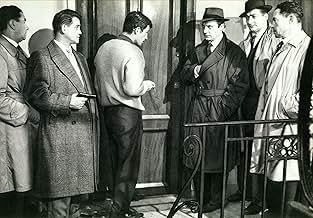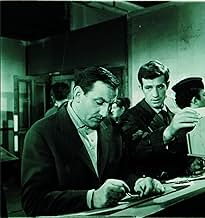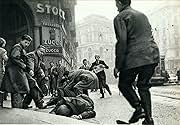Classe tous risques
- 1960
- Tous publics
- 1h 50m
IMDb RATING
7.5/10
4.8K
YOUR RATING
A ruthless criminal flees from the pursuit, involving more and more casualties.A ruthless criminal flees from the pursuit, involving more and more casualties.A ruthless criminal flees from the pursuit, involving more and more casualties.
Simone Desmaison
- Thérèse Davos
- (as Simone France)
Jean-Pierre Zola
- Le patron de l'agence privée
- (as J.P. Zola)
Philippe March
- Jean Martin
- (as Aimé de March)
Featured reviews
Both Bresson and Melville are reputed to be big fans of "Classe Tous Risques" and it's easy to see why; either man could have directed this classic French gangster picture. The actual director was Claude Sautet and it's one of the greatest second films in movie history, (in the 15 year period between 1956 and 1970 Sautet made only 4 films). He made this one in 1960 around the time of the New Wave and while it's more traditional than something Godard or Truffaut might have done, nevertheless Sautet brings to it a freshness of approach that other gangster pictures of the period seem to lack. From the absolutely stunning opening sequence it's clear that this film will be infused with a good dose of existential angst as well as the requisite thrills that a really good gangster movie needs.
Two fugitives, (Lino Ventura and Stan Krol), have decided it's time to get out of Italy and back to France as the net closes in around them but they need money. They commit a foolhardy, though daring, daylight robbery and go on the run. This opening and the chase that follows is as good as anything in crime movies. The money they make, however, is hardly enough to sustain them, (Ventura has a wife and two sons to support), so they must rely on a network of friends and criminal associates and men on the run, already operating on the very edge, need all the friends they can get, however untrustworthy they may be and these guys friends prove to be very untrustworthy indeed but when tragedy strikes Ventura seems to have no option.
With the possible exceptions of Dassin's "Rififi" and several of Jean-Pierre Melville's classic gangster pictures this remains one of the greatest of genre films and is all the better for being, fundamentally, a low-key character piece. Ventura is perfect as the world-weary thief who would really rather just settle down and raise his family and he is matched by a young Jean-Paul Belmondo as the stranger who becomes his only real friend and ally. The brilliant black and white cinematography is by Ghislain Cloquet, (it was shot largely on location), and it is beautifully adapted by Sautet, Pascal Jardin and Jose Giovanni from Giovanni's novel.
Two fugitives, (Lino Ventura and Stan Krol), have decided it's time to get out of Italy and back to France as the net closes in around them but they need money. They commit a foolhardy, though daring, daylight robbery and go on the run. This opening and the chase that follows is as good as anything in crime movies. The money they make, however, is hardly enough to sustain them, (Ventura has a wife and two sons to support), so they must rely on a network of friends and criminal associates and men on the run, already operating on the very edge, need all the friends they can get, however untrustworthy they may be and these guys friends prove to be very untrustworthy indeed but when tragedy strikes Ventura seems to have no option.
With the possible exceptions of Dassin's "Rififi" and several of Jean-Pierre Melville's classic gangster pictures this remains one of the greatest of genre films and is all the better for being, fundamentally, a low-key character piece. Ventura is perfect as the world-weary thief who would really rather just settle down and raise his family and he is matched by a young Jean-Paul Belmondo as the stranger who becomes his only real friend and ally. The brilliant black and white cinematography is by Ghislain Cloquet, (it was shot largely on location), and it is beautifully adapted by Sautet, Pascal Jardin and Jose Giovanni from Giovanni's novel.
Classe Tous Risques (The Big Risk) is repeatedly recommended every time I look up a Jean-Pierre Melville film that I had to give it a watch as soon as possible. Since I've been discovering Melville and seemingly working backwards through his filmography, it would be easy for me to mistake this as one of his films, but it was made in 1960, by Claude Sautet, before Melville would come and stake his claim on french neo-noir.
Classe Tous Risques has two of the best lead men of the time, Lino Ventura and Jean-Paul Belmondo. Ventura plays Abel, a gangster exiled in Italy with his wife and two kids, who wants to come back to Paris because the police are closing in on him. After a roaring and fast paced opening with a big surprise, Abel eventually gets hooked up with Eric Stark (Belmondo) who wants to get into the criminal underworld. Stark becomes Abel's chauffeur and eventual only friend in an underworld that turns it's back on Abel after everything he's done and been through. The film shows the the duality of the two men, the older Abel at the end of his time after tragedy strikes him, and the younger Eric starting off the same way Abel did, falling in love with a beautiful woman who sticks with her man despite the world they are a part of. It never ends pretty for them, or their loved ones. Its one thing to see a individual criminal come to his demise, its different when he has loved ones he risks taking down with him.
Much like Melville's film, the seemingly simple story gets more subtlety complicated as it goes along. As usual, as what I feel with Melville's films, it left my head spinning (in a good way) and dying to re watch it again to pick up what I missed the first time. Classe Tous Risques is a definite keeper.
Classe Tous Risques has two of the best lead men of the time, Lino Ventura and Jean-Paul Belmondo. Ventura plays Abel, a gangster exiled in Italy with his wife and two kids, who wants to come back to Paris because the police are closing in on him. After a roaring and fast paced opening with a big surprise, Abel eventually gets hooked up with Eric Stark (Belmondo) who wants to get into the criminal underworld. Stark becomes Abel's chauffeur and eventual only friend in an underworld that turns it's back on Abel after everything he's done and been through. The film shows the the duality of the two men, the older Abel at the end of his time after tragedy strikes him, and the younger Eric starting off the same way Abel did, falling in love with a beautiful woman who sticks with her man despite the world they are a part of. It never ends pretty for them, or their loved ones. Its one thing to see a individual criminal come to his demise, its different when he has loved ones he risks taking down with him.
Much like Melville's film, the seemingly simple story gets more subtlety complicated as it goes along. As usual, as what I feel with Melville's films, it left my head spinning (in a good way) and dying to re watch it again to pick up what I missed the first time. Classe Tous Risques is a definite keeper.
In Milan, the gangster Abel Davos (Lino Ventura) is sentenced to death "In absentia" and decides to return to France. Abel is a family man with wife Thérèse Davos (Simone France) and two sons, and his partner Raymond Naldi (Stan Krol) helps Abel and his family to flee to Nice. However Thérèse and Raymond are killed by the police and Abel uses his former friends in Paris to help him to go to Paris with his sons. They hire the driver Eric Stark (Jean-Paul Belmondo) to bring Abel and his kids to Paris in an ambulance. Along their journey, Eric helps the aspirant actress Liliane (Sandra Milo) on the road and she also goes to Paris in the ambulance. But soon Abel learns that he is alone and his friends when he was powerful will not help him and he counts only with the support of Eric. What will happen to him?
"Classe tous risques" is a great film-noir with the story of the last days of a gangster. The plot shows that there is no code of honor or friendship after the fall of a powerful gangster. All his former friends do not help him when he needs. The conclusion is adequate for the whole situation. My vote is eight.
Title (Brazil):"Como Fera Encurralada" ("Like Trapped Beast")
"Classe tous risques" is a great film-noir with the story of the last days of a gangster. The plot shows that there is no code of honor or friendship after the fall of a powerful gangster. All his former friends do not help him when he needs. The conclusion is adequate for the whole situation. My vote is eight.
Title (Brazil):"Como Fera Encurralada" ("Like Trapped Beast")
"Classe tous risques" feels like the granddaddy of "The Sopranos" in mixing the criminal and the domestic, and of the buddy film to feel as contemporary as "Reservoir Dogs."
Even as these gangsters are affectionately entangled with wives, children, lovers and parents, they are coldly ruthless, and we are constantly reminded they are, no matter what warm situation we also see them in. They can tousle a kid's hair - and then shoot a threat in cold blood. The key is loyalty, and the male camaraderie is beautifully conveyed, without ethnic or class stereotypes, even as their web of past obligations and pay backs narrows into suspicion and paranoia, as the old gang is in various stages of parole, retirement, out on bail or into new, less profitable ventures. An intense accusation is of sending a stranger to perform an old escape scenario. It is a high point of emotion when a wife is told off that she's not the one the gangster is friends with, while virtually the only time we hear music on the soundtrack is when he recalls his wife.
Streetscapes in Italy and France are marvelously used, in blinding daylight to dark water and highways, from the opening set up of a pair of brazen robbers -- who are traveling with one's wife and two kids. Rugged, craggy Lino Ventura captures the screen immediately as the criminal dad. And the second thug is clearly a casually avuncular presence in their lives, as they smoothly coordinate the theft and escape, in cars, buses, on boats and motorcycles, in easy tandem. This is not the cliché crusty old guy softened with the big-eyed orphan; these are their jobs and their families and they intersect in horrific ways.
The film pulls no punches in unexpectedly killing off characters, directly and as collateral damage, and challenging our sympathy for them, right through to the unsentimental end, which is probably why there was never an American remake.
It seems so fresh that it's not until Jean-Paul Belmondo enters almost a third of the way into the film, looking so insouciant as a young punk, that one realizes that this is from 1960. Sultry Sandra Milo has smart and terrific chemistry with him, from an ambulance to an elevator to a hospital bed.
While the Film Forum was showing a new 35 mm print with newly translated subtitles, it was not pristine. The program notes explained that the title refers to a kind of insurance policy and is pun on "tourist class."
Even as these gangsters are affectionately entangled with wives, children, lovers and parents, they are coldly ruthless, and we are constantly reminded they are, no matter what warm situation we also see them in. They can tousle a kid's hair - and then shoot a threat in cold blood. The key is loyalty, and the male camaraderie is beautifully conveyed, without ethnic or class stereotypes, even as their web of past obligations and pay backs narrows into suspicion and paranoia, as the old gang is in various stages of parole, retirement, out on bail or into new, less profitable ventures. An intense accusation is of sending a stranger to perform an old escape scenario. It is a high point of emotion when a wife is told off that she's not the one the gangster is friends with, while virtually the only time we hear music on the soundtrack is when he recalls his wife.
Streetscapes in Italy and France are marvelously used, in blinding daylight to dark water and highways, from the opening set up of a pair of brazen robbers -- who are traveling with one's wife and two kids. Rugged, craggy Lino Ventura captures the screen immediately as the criminal dad. And the second thug is clearly a casually avuncular presence in their lives, as they smoothly coordinate the theft and escape, in cars, buses, on boats and motorcycles, in easy tandem. This is not the cliché crusty old guy softened with the big-eyed orphan; these are their jobs and their families and they intersect in horrific ways.
The film pulls no punches in unexpectedly killing off characters, directly and as collateral damage, and challenging our sympathy for them, right through to the unsentimental end, which is probably why there was never an American remake.
It seems so fresh that it's not until Jean-Paul Belmondo enters almost a third of the way into the film, looking so insouciant as a young punk, that one realizes that this is from 1960. Sultry Sandra Milo has smart and terrific chemistry with him, from an ambulance to an elevator to a hospital bed.
While the Film Forum was showing a new 35 mm print with newly translated subtitles, it was not pristine. The program notes explained that the title refers to a kind of insurance policy and is pun on "tourist class."
"Classes tous risques" is one of the best "gangsters" films noirs France has ever produced.Perfect cast :Lino Ventura,a young Jean -Paul Belmondo (who made "a bout de souffle",Godard's thing, the same year),Marcel Dalio and a fine supporting cast ;brilliant script by José Giovanni -who also wrote "le trou" Becker's masterpièce the same year!What a year for him!;wonderful black and white cinematography by Ghislain Cloquet.And taut action,first-class directing by Claude Sautet,who surpasses Jean-Pierre Melville .Whereas the latter films gangsters movie with metaphysical pretensions,which sometimes lasts more than two hours,Claude Sautet directs men of flesh and blood,and the presence of the two children adds moments of extraordinary poignancy which Melville has never been able to generate .And Sautet avoids pathos,excessive sentimentality:the last time Ventura sees his children,coming down in the metro (subway)is a peak of restrained emotion.
Ventura portrays a gangster whose die is cast when the movie begins.He thinks that he can rely on his former acquaintances ,but they are all cowards -we are far from manly friendship dear to Jacques Becker ("touchez pas au grisbi" ) which Melville was to continue throughout the sixties-sometimes abetted by mean women (the film noir misogyny par excellence),living in a rotten microcosm,ready to inform on -we are far from Jean Seberg's simplistic behavior in Godard's "opus"-.
Cloquet works wonders with the picture:the scene on the beach in a starless night when the two children see their mother die after the shoot-out with the customs officers is absolutely mind-boggling.
There's a good use of voice-over,which Sautet only uses when necessary;thus ,the last lines make the ending even stronger than if we have attended the scenes.
Claude Sautet had found a good niche ,and he followed the "classes tous risques" rules quite well with his follow-up "l'arme à gauche" (1965) which featured Ventura again and made a good use of a desert island and a ship.Had he continued in that vein,France would have had a Howard Hawks.In his subsequent works ,only "Max et les ferrailleurs " (1971) showed something of the brilliance he displayed in the first half of the sixties.He had become ,from "les choses de la vie" onwards,the cinema de qualité director who used to focus on tender-hearted bourgeois in such works as "Cesar et Rosalie" (1972),"Vincent François ,Paul et les autres" (1974) or "Mado" (1976)
Ventura portrays a gangster whose die is cast when the movie begins.He thinks that he can rely on his former acquaintances ,but they are all cowards -we are far from manly friendship dear to Jacques Becker ("touchez pas au grisbi" ) which Melville was to continue throughout the sixties-sometimes abetted by mean women (the film noir misogyny par excellence),living in a rotten microcosm,ready to inform on -we are far from Jean Seberg's simplistic behavior in Godard's "opus"-.
Cloquet works wonders with the picture:the scene on the beach in a starless night when the two children see their mother die after the shoot-out with the customs officers is absolutely mind-boggling.
There's a good use of voice-over,which Sautet only uses when necessary;thus ,the last lines make the ending even stronger than if we have attended the scenes.
Claude Sautet had found a good niche ,and he followed the "classes tous risques" rules quite well with his follow-up "l'arme à gauche" (1965) which featured Ventura again and made a good use of a desert island and a ship.Had he continued in that vein,France would have had a Howard Hawks.In his subsequent works ,only "Max et les ferrailleurs " (1971) showed something of the brilliance he displayed in the first half of the sixties.He had become ,from "les choses de la vie" onwards,the cinema de qualité director who used to focus on tender-hearted bourgeois in such works as "Cesar et Rosalie" (1972),"Vincent François ,Paul et les autres" (1974) or "Mado" (1976)
Did you know
- TriviaCo-writer/Director Claude Sautet said after the shooting that he did not know that the Abel Davos - Danos - character was inspired by a gangster who collaborated with the Nazis against French resistance and Jews during German occupation.
- Quotes
Eric Stark: The best thing about me is my left hook.
- ConnectionsFeatured in Claude Sautet ou La magie invisible (2003)
- How long is The Big Risk?Powered by Alexa
Details
Box office
- Gross US & Canada
- $132,928
- Opening weekend US & Canada
- $11,945
- Nov 20, 2005
- Gross worldwide
- $132,928
- Runtime1 hour 50 minutes
- Color
- Aspect ratio
- 1.66 : 1
Contribute to this page
Suggest an edit or add missing content





